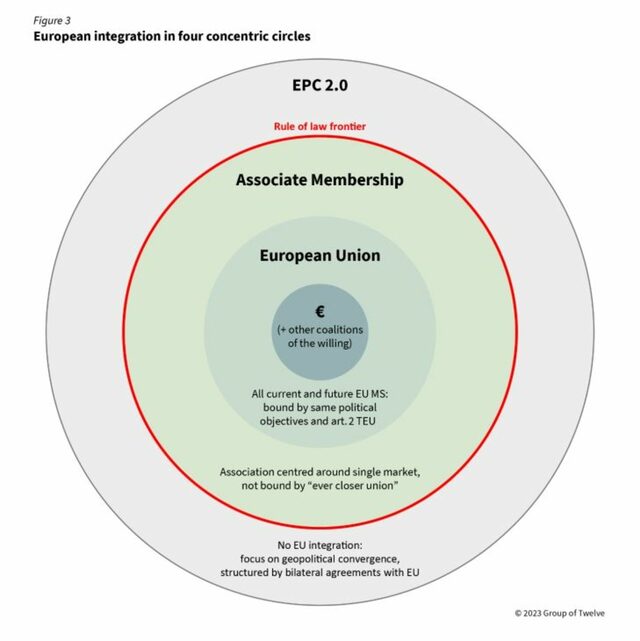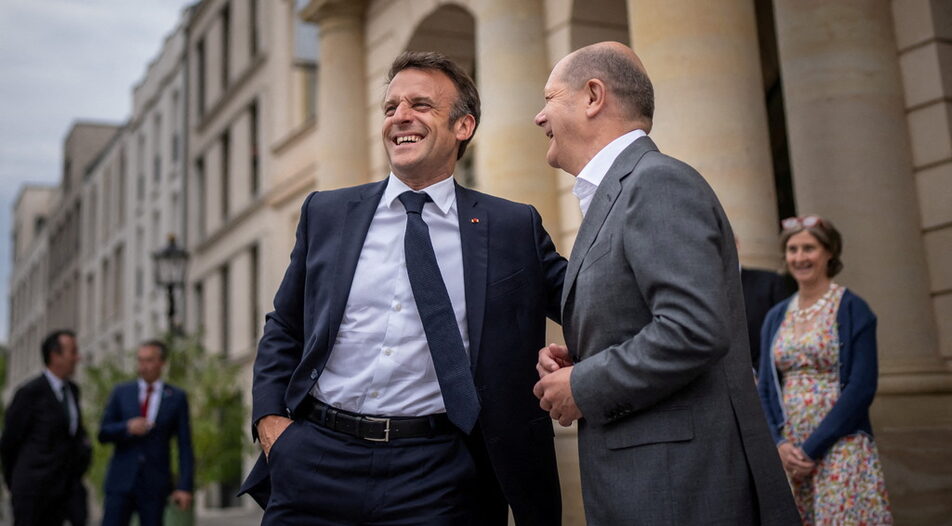The decade in which the EU tried desperately not to fall apart is quickly giving way to a political consolidation that would facilitate further enlargement - most notably entry for Ukraine, but also for the Western Balkans. The options on the table are either a fundamental change of the union - or a downfall in terms of geopolitical influence and economic competitiveness.
The momentum for change received a strong boost last month when the Group of 12 - independent experts on European law and integration - set up by Germany and France, presented its ideas. Their report provides guidance on how to make the EU work more effectively and preserve the principle of the rule of law as fundamental.
Their proposals include a four-speed EU (see chart), reforming the institutions (including reducing the number of both MEPs and Commissioners), reducing the areas where member states can cast a veto, and preparing the Union for enlargement by 2030. While most of the ideas are not new, their concrete formulation has struck the right balance between boldness and achievability. The report does not represent the official position of Germany and France, but it kick starts a discussion that will commence as early as next month at the informal EU summit in Granada.

At first glance, the prospect of the EU divided into concentric circles sounds intimidating for a poorly integrated and not particularly active country like Bulgaria, which risks staying in the periphery, away from the core. On the other hand, this makes it even more important for Sofia to join the Eurozone and Schengen. And it also opens up opportunities. As Olivier Costa said, one of the two rapporteurs of the Group of 12, Bulgaria could benefit from these reforms.
At the heart of Europe
"The rule of law is something that is non-negotiable for us. So the rule of law will not only be a mandatory condition to belong to the EU, but even to remain an associate member," Costa, who teaches at the University of Political Science in Bordeaux, told Capital weekly. The report for the first time provides for a scenario in which leaving the EU or losing candidate member status could happen not at will (as was the case when Britain left), but if the basic principle of the rule of law is not respected.
The authors of the document stress that despite the existing mechanisms, there are areas where there is more to be done, such as the fight against money laundering and the misuse of EU funds. This can also happen without changing the treaties - through the Contingent Mechanism, which has been used vis-a-vis Hungary, but the report envisions that in the future the blocking of funds ought to be decided by a qualified majority in the council rather than by unanimity.
Control becomes even more necessary against the background of proposals to increase the EU budget, which is needed because if Ukraine joins, most member states will suddenly become net contributors and a huge amount of EU funds will flow east. At the same time, as EU budget commissioner Johannes Hahn commented after the presentation of the Group of 12 report, "if the EU wants to be a geopolitical player, this has to be reflected in the budget structure".
Bulgaria has a chance for the highest level of integration
"For the EU, sooner or later the moment of truth will come: if progress for the 27 members is not possible, it may be to everyone's mutual benefit to design a path towards different levels of integration or some form of freer association for new or current member states", the report says. In this regard, the authors propose four speeds of integration: an inner circle (to include Schengen and the eurozone), the other EU countries, associate members (to benefit from the internal market, European funds, etc.) and a European political community.
As the document itself acknowledges, not all states are prepared to continue to cede sovereign decision-making in many areas to Brussels, and neither does the EU currently have the capacity not only for more integration but also for enlargement. The ten-year blockade by some member states of Bulgaria and Romania joining Schengen is a typical example of this. However, Olivier Costa specifies that the inner circle will not be a "club for the chosen", but on the contrary, the idea is "to be flexible and open and to depend on each country to belong to the circle it wants to be in. As long as it respects the criteria". According to Costa, it should no longer be possible for 500 million citizens to have to wait to move forward in an area (such as defense, industrial policy and the green economy, digitalisation, etc.) on the say so of Viktor Orban.
The Schengen blockade may fall
Among the experts' proposals are a serious reform of the EU institutions. It includes reducing the number of members of the European Parliament (or keeping the current number of 751, with no increase in case of enlargement) and of commissioners, as well as changing the way of voting in the council and expanded use of qualified majority voting. And while the option of not every country having its own commissioner sounds rather hard to "sell" politically, sharing policy portfolios and hierarchies by portfolio on a rotational basis makes sense.
The latter could help even in the case of Schengen entry. "All decisions beyond those requiring treaty change (such as enlargement, foreign policy and security, taxation and social security) will be able to be taken by qualified majority instead of unanimity of member states", Costa points out. Member states will still retain the right to a so-called sovereignty safety net, which will allow them some form of compensation if the decision strongly affects their interests.
How to make enlargement possible and keep the EU working
According to Dr. Rumena Filipova, president and founder of the Institute for Global Analysis, there is an overlap between the content of the document and the direction the EU has been moving in over the past year. "And the working group document again mentions that the EU needs to make serious internal and institutional modifications before it can be 30 or more countries," she points out.
Political scientist Daniel Smilov predicts that the more likely scenario is that the changes will happen without opening up the EU's core treaties, because that would require full agreement from all member states. However, those who want more integration should be allowed to have it. And the experts' report points the way. "Certainly what is being proposed is in Bulgaria's interest, but there are circles in the country that would oppose our inclusion in a more integrated EU circle," Smilov points out.
"Our report simply aims to start a discussion," says Olivier Costa. He says some of the changes can happen in the current mandate of the EU institutions, while the more serious reforms need to be implemented before the end of the next one.
The decade in which the EU tried desperately not to fall apart is quickly giving way to a political consolidation that would facilitate further enlargement - most notably entry for Ukraine, but also for the Western Balkans. The options on the table are either a fundamental change of the union - or a downfall in terms of geopolitical influence and economic competitiveness.
The momentum for change received a strong boost last month when the Group of 12 - independent experts on European law and integration - set up by Germany and France, presented its ideas. Their report provides guidance on how to make the EU work more effectively and preserve the principle of the rule of law as fundamental.












